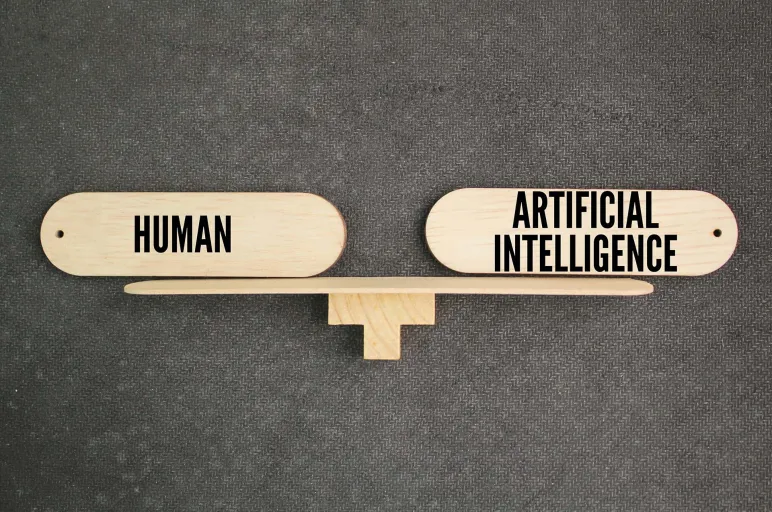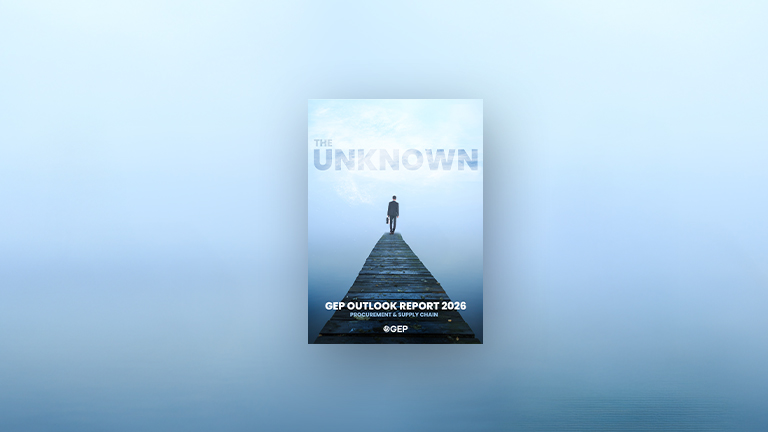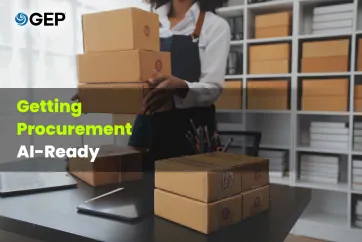
Mastering the Human-AI Balance: A Strategic Guide to Procurement Excellence
- Successful procurement organizations get ahead of the competition by balancing AI's analytical power with human expertise.
- Successful implementation necessitates strong data foundations, targeted pilot projects, and comprehensive training to build AI awareness.
- Future belongs to enterprises that see AI as a collaborative partner that amplifies human capabilities and not as a replacement for procurement teams.
September 11, 2025 | Procurement Strategy 7 minutes read
Organizations globally are battling a critical question: how can they harness AI's power while preserving the human expertise that drives strategic success?
The answer lies not in choosing between human intelligence and artificial intelligence. Instead, it requires finding the perfect balance between technological efficiency and human insight. This balance transforms procurement from a traditional cost-cutting function into a strategic powerhouse that drives business value.
Ready for Procurement Success? GEP Has the Solution
Transform your business with our AI-powered procurement and supply chain software and services
Navigating the Human-AI Balance in Procurement
AI is a game-changer, but it really shines when it's used with human knowledge. Successful procurement leaders know that AI and human intelligence work well together and can do things that neither could do on their own.
The key is to understand where AI performs better than humans and where humans are still needed. Those that get this balance right have a competitive edge when it comes to lowering costs, cutting risks, and finding the best suppliers.
New Ideas and Strategic Input
Innovation in procurement stems from people's creativity. AI can quickly process huge amounts of data, but humans can derive meaningful context from data and turn it into useful information. AI still has a lot to learn when it comes to filtering industry knowledge, market understanding, and creative problem-solving skills that procurement professionals have mastered.
People are good at finding ways for suppliers to work together, coming up with new ways to source goods, and adding value beyond just saving money.
AI helps this new idea by doing a vast amount of data analysis and finding patterns that people would normally miss. This mix of human creativity and AI-powered insights makes a strong base for new ideas in procurement.
Efficiency and Decision Making
AI has boosted procurement efficiency through automation and intelligent processing.
ML algorithms can process purchase orders, validate supplier information, and manage routine approvals without any human intervention whatsoever. This type of automation eliminates bottlenecks and reduces processing times significantly.
However, human judgment is key to complex decision-making. Procurement professionals evaluate supplier proposals, assess risk factors, and make strategic sourcing decisions that consider multiple variables.
The optimal approach would be to combine AI's processing speed with human decision-making expertise.
Less Bias and Mistakes
AI systems help reduce bias in the process of buying things. They use objective criteria for supplier selection, which means they don't let personal preferences or subjective judgments impact their everyday choices. This impartiality leads to an equitable supplier selection process and more reliable procurement outcomes.
Making decisions based on data can cut down on mistakes that happen often in manual processes. But people still need to be in charge for context.
Real-Time Adjustments and Adaptability
Agentic AI can act as an early warning system for enterprises, keeping an eye on suppliers' financial stability, their past performance, even geopolitical risks, and so on, in order to find possible problems. As this monitoring happens in real time, it can help enterprises manage risks in advance and respond quickly to changes in the market.
Furthermore, AI's ability to analyze data is better leveraged when people adapt the insights to their requirements. Procurement teams make use of the insights to arrive at decisions that are in line with the goals of the organization.
Strategies for Successful AI Implementation While Striking a Human Balance
To use AI in procurement, you need to plan carefully and think strategically. While keeping focus on human expertise, companies have to deal with technical, cultural, and operational issues at hand.
Address the Human Element
Change management is the key to making AI work as it should. Procurement teams must know exactly what AI does and how it helps. Leaders need to talk about worries about job loss and show how AI enhances human abilities instead of replacing them.
Training programs help procurement professionals understand AI better and how they can collaborate effectively with intelligent systems.
Build Strong Data Foundations
AI's output always depends on the quality of data it uses. Sometimes, bad choices are made because the information is old, wrong, or incomplete. Therefore, put money into data quality, standardization, and data governance before using AI solutions.
Make data cleansing projects part of the drill to make sure that AI systems get the right data. Clean data ensures AI works better and people trust automated suggestions more, gradually.
Select a Targeted Approach
Successful AI implementation starts with specific use cases rather than enterprise-wide deployment. For that, companies must identify high-impact areas for AI to deliver immediate value. Spend analysis, supplier risk monitoring and contract compliance are some of those areas.
Use pilot projects to learn AI's capabilities and refine implementation approaches, post which a phased rollout could enable scalable solutions.
Training and Upskilling
Procurement pros need new skills to work effectively with AI systems. Technical knowhow, data analysis, and strategic thinking are increasingly becoming indispensable. Organizations must therefore invest in training programs that address these changing requirements.
Hands-on training in AI tools can help procurement teams understand system capabilities and limitations. Ensure regular updates so that upskilling continues to happen as the tech advances.
How to Balance Human Intelligence and AI in Procurement
The most successful procurement organizations look at AI as a collaborative partner. They develop processes that can leverage AI's analytical strength while preserving human expertise for strategic decisions.
The Irreplaceable Role of Humans in Procurement
Although AI has demonstrated impressive capabilities, certain aspects of procurement will continue to require uniquely human skills. These areas involve complex judgment, ethical considerations, and relationship management that AI cannot replicate.
Critical Decision-Making
People need to make decisions and be responsible for them when it comes to high-stakes purchases. People need to keep an eye on a lot of things when they choose strategic suppliers, negotiate big contracts, and make decisions on risk management.
To resolve issues in complicated negotiations, you need to be emotionally intelligent, culturally aware, and able to think out of the box. People know how to read body language, how to deal with other people, and how to change their negotiation strategies depending on the situation.
Ethical Considerations and Compliance
Procurement decisions carry ethical implications that require human judgment. Problem areas such as supplier diversity, environmental sustainability, ESG, or even labor practices for that matter involve values-based choices that AI can't make independently. Procurement needs to make sure decisions are in line with organizational values and ethical standards.
Regulatory compliance requires understanding of legal nuances and contextual factors. While AI can flag potential compliance issues, humans must interpret regulations, assess risk levels, and make decisions about appropriate responses.
Change in Company Goals and Willingness to Take Risks
Changes in organizational strategy need people to understand and adapt. When businesses change their focus, enter new markets, or become more willing to take risk, their procurement strategies must also change. People know how to think strategically and can change how they buy things to help the company reach its new goals.
People should be able to adapt and think differently when markets change, and things happen differently than expected. Procurement professionals make backup plans, find other suppliers, and put in place emergency procurement plans.
Managing Supplier Relationships
Managing a long-term relationship with suppliers requires understanding them, building trust, and interacting with them. As such, working together, coming up with new ideas, and helping each other out are all ways that strong partnerships add value. AI can't really do the same things that procurement professionals do to build and maintain relationships.
Furthermore, internal customer service requires understanding of business needs and stakeholder priorities.
The AI Gap in Procurement: Why High-Growth Firms Must Catch Up Now
Explore how you can leverage AI and automation to transform procurement into a strategic powerhouse
The Road Ahead
Procurement’s future starts with intelligent collaboration between humans and AI systems. Organizations that master this balance will create AI-powered procurement management software functions that are strategically sound, efficient, and more valuable than ever before. They must leverage AI to automate routine processes but at the same time enhance human capabilities in areas that ask for sound judgment, creativity, and relationship management.
Looking ahead, the most successful procurement organizations will view AI as an amplifier of human capabilities rather than a threat to human expertise. This vision of human-AI partnership represents the future of procurement excellence, where the combined power of human insight and AI brings unprecedented success.
Frequently Asked Questions
How Can We Use AI in Procurement Without Hampering Human Creativity?
Enterprises must leverage AI for routine data processing and analysis so that procurement professionals can focus on innovation and strategy. Use AI for analyzing spend, keeping an eye on supplier risk, and making sure contracts are adhered. People can develop plans, build and manage supplier relationships, and come up with innovative ways to solve problems. That said, set clear rules when AI can give advice and insights; ensuring humans are at the helm of decision-making on complicated issues. This method lets creativity thrive while leveraging AI to analyze data.
Why is Human Intervention Irreplaceable in Procurement?
People still need to make ethical decisions, manage relationships, and think strategically. Procurement requires a degree of people-to-people connection and a solid understanding of the situation because it involves complicated negotiations, cultural sensitivity, and managing stakeholders. People are responsible for making important decisions, understanding the rules, and changing plans when business needs change.
AI is great at processing data and finding patterns, but people have the knowledge, creativity, and moral compass needed to make procurement work in complicated business settings.



